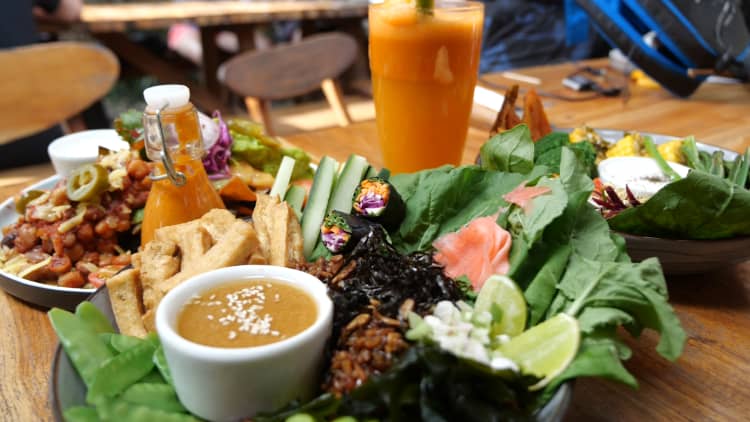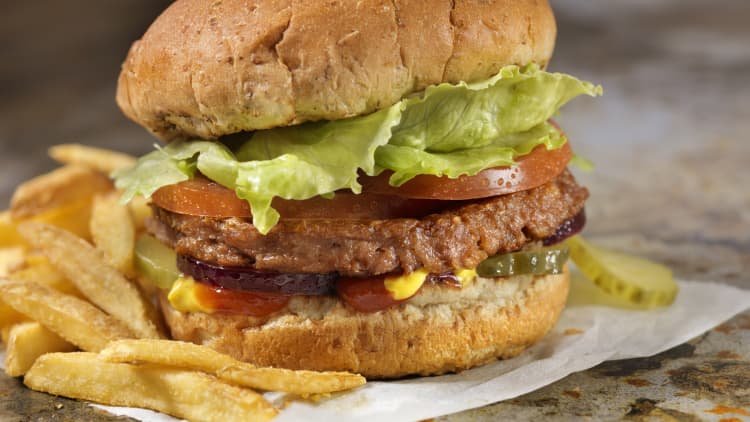Nestle is looking to take a bite of the growing U.S. plant-based burger market.
Through its Sweet Earth brand, which it acquired in 2017, the global food giant will launch its Awesome Burger in the fall. The vegan meat substitute will be available at grocery stores, restaurants and universities.
Sweet Earth founders Brian and Kelly Swette said they began developing their own plant-based burger several years ago — before nearly every restaurant chain announced a plant-based option and Beyond Meat went public.

The Swettes are not newcomers to plant-based meat alternatives either. The company they founded makes about 13,000 pounds of plant-based protein, including meatless bacon and ham, every day. While the Awesome Burger is not Sweet Earth's first veggie burger, it is the first by the brand that is meant to more closely mimic real burgers.
Although the husband and wife team are now focused on vegetarian food, they have prior experience elsewhere in the food and beverage industry. Brian Swette served as chairman of Burger King and as chief marketing officer of PepsiCo. Kelly Swette also worked at PepsiCo, first as a director of marketing and then as a director of national sales.
As the world's largest food company, Nestle is able to help Sweet Earth with sourcing and production — a competitive advantage for the plant-based food brand, according to Kelly Swette. Both Impossible Foods and Beyond Meat, the two leading purveyors of plant-based burgers, have struggled at times to meet soaring demand because of limited production capacity.
"We have great admiration for our competitors and what they're trying to do, but we're also excited about competing," Brian Swette said.
In April, Nestle launched a soy- and wheat-based veggie burger under its Garden Gourmet brand in Europe. German customers can purchase its Incredible Burger in McDonald's.
Sweet Earth's burger will be primarily made with yellow pea protein.
"We just felt for the U.S. market, pea protein is really trending and is popular for a variety of reasons, one of which is that it's an extremely sustainable crop," Kelly Swette said.
Beyond also uses pea proteins for its beef substitutes, while Impossible Foods uses a soy protein base.
An organic version of the Awesome Burger will also be sold. Kelly Swette said that the burger acts similarly to traditional beef when cooked but is higher in protein and fiber.
The Awesome Burger will be priced "competitively" to other plant-based burgers. But down the road, she said, as manufacturing and sourcing improve, the price could move closer to that of a beef burger.
Nestle is not the only Big Food company trying to compete with Impossible Foods and Beyond Meat as more consumers try to reduce how much meat they eat. Tyson Foods sold its stake in Beyond prior to the latter's initial public offering so that it could make its own meatless burger. Kellogg's Morningstar Farms brand plans to be entirely plant-based by 2021. And last year, Unilever acquired The Vegetarian Butcher, a Dutch maker of plant-based meat.
More U.S. consumers are eating meat substitutes as a way of reducing their meat consumption for health and environmental reasons.
Alexia Howard, a senior research analyst at Bernstein, estimates that sales of imitation products, which account for around $13 billion currently, could rise to $40 billion to $41 billion in the next 10 years.



